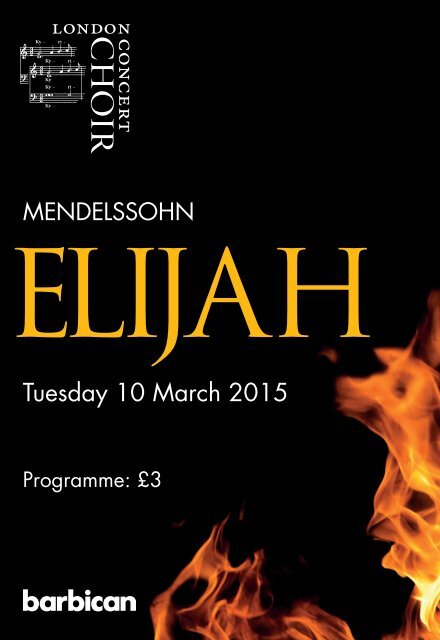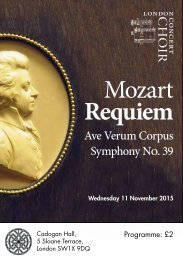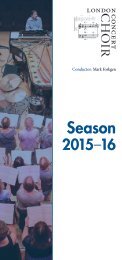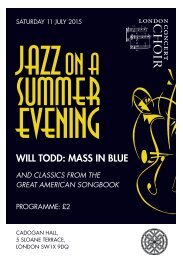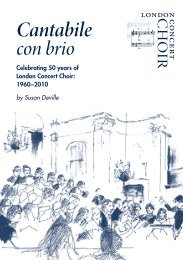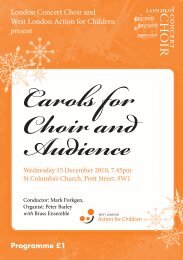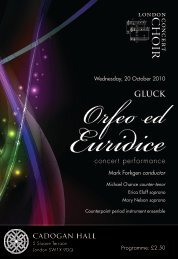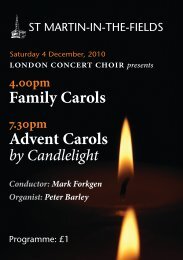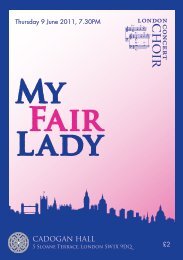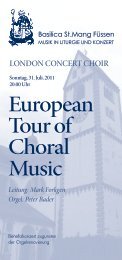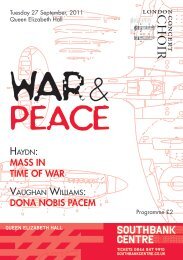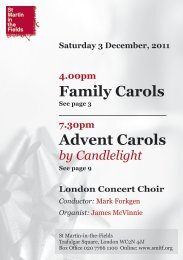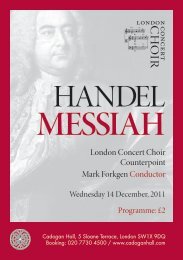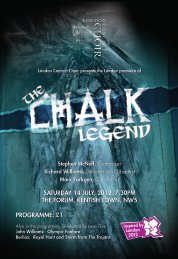10 March, 2015: Elijah (Mendelssohn)
You also want an ePaper? Increase the reach of your titles
YUMPU automatically turns print PDFs into web optimized ePapers that Google loves.
MMENDELSSOHN<br />
ELIJAH<br />
Tuesday <strong>10</strong> <strong>March</strong> <strong>2015</strong><br />
Programme: £3
Welcome to the Barbican<br />
In the interests of your comfort and safety, please note the following:<br />
• Please try to restrain coughing until the normal breaks in the performance.<br />
• If you have a mobile phone or digital watch, please ensure that it is turned off<br />
during the performance.<br />
• In accordance with the requirements of the licensing authority, sitting or<br />
standing in any gangway is not permitted.<br />
• No cameras, tape recorders, other types of recording apparatus, food or drink<br />
may be brought into the auditorium<br />
• It is illegal to record any performance unless prior arrangements have been<br />
made with the Managing Director and the concert promoter concerned.<br />
• Smoking is not permitted anywhere on Barbican premises.<br />
Barbican Centre, Silk St, London EC2Y 8DS<br />
Administration: 020 7638 4141<br />
Box Office Telephone bookings: 020 7638 8891 (9am - 8pm daily: booking fee)<br />
www.barbican.org.uk (reduced booking fee online)<br />
<strong>Elijah</strong><br />
Music by Felix <strong>Mendelssohn</strong><br />
Edited by Michael Pilkington<br />
© Copyright 1996 Novello & Company Limited.<br />
All Rights Reserved. International Copyright Secured.<br />
Used by permission of Novello & Company Limited.<br />
Programme note © Sabine Köllmann<br />
Programme designed by Stephen Rickett and edited by Eleanor Cowie<br />
London Concert Choir - A company limited by guarantee, incorporated in England<br />
with registered number 3220578 and registered charity number <strong>10</strong>57242<br />
Registered Office 7 Ildersly Grove, Dulwich, London SE21 8EU
Tuesday <strong>10</strong> <strong>March</strong> <strong>2015</strong><br />
Barbican Hall<br />
<strong>Mendelssohn</strong><br />
<strong>Elijah</strong><br />
Mark Forkgen Conductor<br />
Erica Eloff Soprano<br />
Jeanette Ager Mezzo soprano<br />
Nicholas Mulroy Tenor<br />
Toby Stafford-Allen Bass<br />
London Concert Choir, Canticum<br />
Southbank Sinfonia<br />
There will be an INTERVAL of 20 minutes after Part One
Felix <strong>Mendelssohn</strong> (1809–1847)<br />
ELIJAH (Op. 70)<br />
Oratorio for soloists, chorus, orchestra and organ<br />
Text derived from the Lutheran Bible<br />
by Julius Schubring and the composer<br />
English version by William Bartholomew<br />
Toby Stafford-Allen<br />
Nicholas Mulroy<br />
Jeanette Ager<br />
Erica Eloff<br />
Harry Mobbs treble<br />
Canticum semi-chorus<br />
London Concert Choir<br />
<strong>Elijah</strong> the Prophet<br />
Ahab, King of Israel; Obadiah, Ahab’s Steward<br />
Queen Jezebel; an Angel<br />
The Widow; an Angel<br />
The Youth<br />
Angels<br />
Israelites, Priests of Baal<br />
In 1846, the Birmingham Music Festival hosted the premiere of Felix <strong>Mendelssohn</strong>’s<br />
oratorio <strong>Elijah</strong>, a sacred work based on the Old Testament prophet’s life. The organizers<br />
had commissioned a new work by the anglophile German composer whose first oratorio<br />
St Paul had been a great success at the 1837 festival. In the course of his busy life<br />
<strong>Mendelssohn</strong> visited Britain many times, formed close associations with this country and<br />
was well-loved here. The reaction to the first performance of his <strong>Elijah</strong> was extraordinary.<br />
<strong>Mendelssohn</strong> himself conducted the work in a midday performance to an audience of<br />
two thousand in Birmingham Town Hall. The heartfelt commitment of the musicians,<br />
‘all executing the music with special zest and the utmost fire and spirit’, as <strong>Mendelssohn</strong> wrote<br />
afterwards, left the audience transfixed – until the last note which, according to the Times,<br />
‘was drowned in a long-continued unanimous volley of plaudits, vociferous and deafening. It<br />
was as though enthusiasm, long-checked, had suddenly burst its bonds and filled the air with<br />
shouts of exultation. ... Never was there a more complete triumph – never a more thorough<br />
and speedy recognition of a great work of art’. A full four choruses and four arias were encored.<br />
This extraordinary response to a sacred work of music is evidence of <strong>Mendelssohn</strong>’s success<br />
in conveying the drama of <strong>Elijah</strong>’s story, thus appealing to the emotions of his audience<br />
and gripping their attention, instead of following the advice of his librettist and friend, the<br />
Lutheran pastor Julius Schubring, who had repeatedly urged the composer to ‘keep down
the dramatic element’ and stress the sacred so as to ‘edify the heart of the listener’. Schubring<br />
thought <strong>Mendelssohn</strong>’s concept of a predominantly realistic and dramatic depiction of the<br />
events in the prophet’s life wholly inappropriate for religious music. But <strong>Mendelssohn</strong><br />
insisted that, in a story based on the Old Testament, ‘the personages should act and speak<br />
as if they were living beings’.<br />
A conflict of ideas between composer and librettist had marked the genesis of <strong>Elijah</strong><br />
since its first conception ten years earlier. After the successful premiere of St Paul in 1836<br />
<strong>Mendelssohn</strong> had asked his London friend Carl Klingemann to work with him on an<br />
outline for an oratorio based on the prophet <strong>Elijah</strong>. A special inspiration had come to him<br />
from a passage in the first Book of Kings starting with the words ‘And behold, the Lord<br />
passed by’ (which later gave rise to one of the most remarkable choruses in the finished<br />
work). The collaboration with Klingemann did not progress, so that in 1838 <strong>Mendelssohn</strong><br />
approached Schubring. The clergyman urged <strong>Mendelssohn</strong> to introduce New Testament<br />
ideas and characters into the oratorio and stress <strong>Elijah</strong>’s significance as the ‘forerunner of<br />
the Messiah’. The composer, however, saw above all the musical and dramatic possibilities<br />
of the colourful Old Testament episodes. Opposing views about the nature of a sacred work<br />
brought the project to a standstill.<br />
The plan for <strong>Elijah</strong> was put aside until the year 1845 when the composer was commissioned<br />
to provide a new work for the Birmingham Music Festival of the following year. The scheme<br />
for <strong>Elijah</strong> which had been gestating for such a long period suddenly had to be developed in<br />
the shortest of times, and <strong>Mendelssohn</strong> yet again asked for the help of his friends Schubring<br />
and Klingemann as well as the translator William Bartholomew. There followed a period of<br />
feverish work and extensive communication between the different parties involved. Despite<br />
his many other commitments, including the Leipzig Gewandhaus Orchestra and the Leipzig<br />
Conservatoire which he had founded in 1843, <strong>Mendelssohn</strong> took a keen interest in the<br />
smallest details of the libretto and its translation into English which he supervised closely,<br />
adjusting the music, composed with the German text in mind, to the English version.<br />
In the run-up to the deadline <strong>Mendelssohn</strong> was simultaneously working on the last sections<br />
of the oratorio, in rehearsal with some of the musicians in London while, in Birmingham,<br />
the choir was already rehearsing some choruses. The local chorus master did not receive the<br />
last chorus until nine days before the premiere! Despite the overwhelming success of <strong>Elijah</strong><br />
and the exhaustion that <strong>Mendelssohn</strong> must have felt after the severe strains of completing<br />
the work under such difficult circumstances, he started revising it almost immediately<br />
afterwards. He also made plans for a third oratorio, Christus. The following year, 1847, saw a
number of performances of the revised <strong>Elijah</strong> in England under the baton of the composer,<br />
and its publication in print. In November of that year, after a stroke, <strong>Mendelssohn</strong> died at<br />
the age of only thirty-eight, his premature death not only precipitated by the shattering loss<br />
of his beloved sister Fanny but also by the exertions of overwork.<br />
<strong>Mendelssohn</strong>’s oratorio is much influenced by Handel and Bach, composers he came<br />
to appreciate from a young age, when he was a pupil at Carl Zelter’s Singakademie in<br />
Berlin. As a twenty-year old, <strong>Mendelssohn</strong> had put on the first performance of Bach’s<br />
St Matthew Passion since the composer’s death in 1750, thus initiating a revival of interest in<br />
Bach’s music. The sense of drama in <strong>Elijah</strong>, for example in the different roles that the choir<br />
plays – sometimes part of the action, sometimes reinforcing what has been expressed in the<br />
arias, sometimes standing aside and providing spiritual advice – goes back to his Baroque<br />
predecessors. <strong>Mendelssohn</strong> is clearly indebted to Bach in his masterly fugal writing, as in<br />
the depiction of an increasingly angry crowd in the chorus ‘Woe to him!’ with its insistence<br />
on the words ‘And why’. An echo of Bach’s St John Passion and its famous ‘Es ist vollbracht’<br />
(It is finished) can be heard in <strong>Elijah</strong>’s ‘It is enough’, the only aria in <strong>Mendelssohn</strong>’s oratorio<br />
with a solo instrumental obbligato. But while <strong>Mendelssohn</strong> builds on the great oratorios<br />
of the past, he develops the form in several innovative ways, integrating a variety of styles,<br />
from the symphonic to the intimacy of Lieder-like arias.<br />
Unlike his earlier oratorio St Paul, <strong>Elijah</strong> has no narrator. <strong>Mendelssohn</strong> varies the style<br />
of the recitatives to help maintain the dramatic tension which he builds right from the<br />
beginning. The story of the prophet <strong>Elijah</strong> does not have a continuous narrative, but consists<br />
of a series of episodes. Nevertheless the composer creates an overarching structure from<br />
the Introduction in which the prophet delivers God’s curse of a drought on the Israelite<br />
kingdom of Ahab and his queen Jezebel for having established the worship of Baal, through<br />
various confrontations in which <strong>Elijah</strong> proves the true power of Jehovah, the God of Israel’s<br />
forefathers, the overcoming of his doubts about the effectiveness of his endeavours, to his<br />
final ascent into heaven in a fiery chariot. The theme that binds the narrative together is<br />
faith. <strong>Mendelssohn</strong> divides <strong>Elijah</strong> into two parts, quite different in character.<br />
PART ONE<br />
The highly dramatic nature of the First Part is established right at the beginning of the<br />
oratorio: instead of the expected overture <strong>Elijah</strong>, sung by a bass, intones the curse of a<br />
drought against Israel for having turned to a heathen god, set to a sinister series of tritones,<br />
before the overture develops this motif, depicting the years of suffering that follow and
uilding up tension. The overture then leads straight into the first chorus in which the<br />
people cry out for help and express their despair about famine and drought, the effects of<br />
which are described in the immediately following choral recitative. This highly original<br />
through-composed opening plunges the audience straight into the heart of the drama. The<br />
Baal-worshippers are encouraged to repent by Obadiah, sung by a tenor, representing the<br />
small minority of Israelites who have remained faithful to Jehovah.<br />
An angel sends <strong>Elijah</strong> first to Cherith’s brook where he finds water and food for himself,<br />
and then to the house of a widow whose son is dying. He miraculously restores the boy to<br />
health, which leads to a duet in which the widow and <strong>Elijah</strong> sing God’s praises, followed by<br />
a chorus meditating on this event (No. 9). On his return to Ahab’s kingdom <strong>Elijah</strong> confronts<br />
the Baal-worshippers and challenges them to a contest of the deities in which the true God<br />
will be revealed. A sacrificial offering is prepared but not yet lit by fire. Despite increasingly<br />
imploring cries to Baal to send fire and claim the offering, the sacrifice remains untouched.<br />
These renewed cries to Baal, interspersed with <strong>Elijah</strong>’s taunting, become more and more<br />
intense, each expressed in a different musical language that shows the slow onset of doubt<br />
and mounting desperation. Then <strong>Elijah</strong> repeatedly invokes God to consume the sacrifice<br />
until He indeed sends down fire from heaven. Newly convinced, the people turn on the<br />
Baal-worshippers, incited by <strong>Elijah</strong>. The prophet then prays to God to end the drought,<br />
and after a tense wait in which a boy is sent up a hill to look out for clouds, the rain finally<br />
arrives in great torrents to the joyful cries of ‘Thanks be to God’.<br />
This First Part contains the more dramatic elements of the story which give <strong>Mendelssohn</strong> the<br />
opportunity to represent in music contrasting states of emotion: wrath and sinister foreboding<br />
(<strong>Elijah</strong>’s delivery of the curse); helplessness and despair (especially in the first chorus and<br />
following recitative); apprehension and fear, followed by hope (No. 5: ‘Yet doth the Lord see<br />
it not’); hopelessness (in the widow scene), followed by elation when ‘darkness turns to light’;<br />
self-righteousness subverted by doubt (in the increasingly anxious Baal-choruses), spiteful<br />
taunting (<strong>Elijah</strong> suggesting in a mocking tone that Baal might be on a journey, or even asleep);<br />
the desire for murder (No. 11: ‘Let thy flames fall and extirpate the foe!’) and vengeance<br />
(No. 16: ‘Take all the prophets of Baal ... and slay them!’), and finally overwhelming gratitude<br />
(No. 20: ‘Thanks be to God’). Nature reflects these extremes of human emotions: the<br />
music evokes images of drought, fire, of an oppressive sky and stagnating air (in the music of<br />
the youth in the rain scene, No. 19), followed by storms and torrential rainfall (the imaginative<br />
orchestration in No. 20 vividly depicts the rushing water). As for Jehovah, he is at once a God<br />
of wrath and vengeance (hear, e.g., the fearful first part of chorus No. 5: ‘He visiteth all the
fathers’ sins upon the children to the third and the fourth generation’, as well as the arias<br />
Nos. 17 and 18), and a God of love and mercy (in the second part of No. 5 where the chorus<br />
changes mood and sings ‘His mercies on thousands fall’). <strong>Mendelssohn</strong>’s varied orchestration<br />
and his imaginative writing for choir and soloists build and sustain the dramatic tension<br />
throughout this First Part in an almost operatic fashion.<br />
Part Two<br />
The Second Part has a distinctly Handelian quality. With fewer dramatic moments, its mood<br />
is altogether more lyrical and pious. The opening soprano aria ‘Hear ye Israel’ starts in the<br />
key of B minor, urging the people to have faith in God, and ends with the reassurance in<br />
B major that He gives comfort and strength. This idea is reinforced in the majestic chorus<br />
‘Be not afraid’ (No. 22). The positive mood is destroyed again when, in one of the few<br />
moments of high drama in this second part, Queen Jezebel whips up hatred against <strong>Elijah</strong>.<br />
The fickleness of the people is exposed when she asks a series of suggestive questions about<br />
the prophet’s role in calling down the curse and destroying the Baal-worshippers which the<br />
people answer with the menacing call ‘Woe to him! He shall perish!’ (No. 24).<br />
Warned by Obadiah, <strong>Elijah</strong> flees to the desert. Weary and broken in spirit, he expresses his<br />
longing for death in the moving, intimate aria with cello obbligato, ‘It is enough’ (No. 26).<br />
In his sleep he is visited by angels (a three-part female voice choir singing ‘Lift thine eyes‘,<br />
No. 28) who bring him comfort and reassurance, again reinforced by the following chorus.<br />
<strong>Elijah</strong> is sent to Mount Horeb where the divine presence of God will be revealed to him. His<br />
doubts (‘O Lord I have laboured in vain’, No. 30) are dispersed in the famous alto aria ‘O rest<br />
in the Lord’, urging him ‘to fret not thyself because of evildoers’ (No. 31). After a journey<br />
of forty days and nights <strong>Elijah</strong> reaches the holy mountain, anxiously awaiting the divine<br />
revelation. It does not come in the mighty storm that he has to endure, nor in the ensuing<br />
earthquake, nor in the fire that follows. Instead, God speaks to him ‘in a still, small voice’,<br />
telling him to return to Israel and continue his deeds of faith. This crucial scene unfolds<br />
in the astonishing chorus ‘Behold, God the Lord passed by’ (No. 34) with its powerful<br />
orchestration depicting the forces of nature, and the huge dynamic range in the choral part.<br />
<strong>Elijah</strong> returns with his faith restored and continues his holy work until his time has<br />
come to ascend into heaven in a fiery chariot, an image brought to life in the spectacular<br />
chorus ‘Then did <strong>Elijah</strong> the prophet break forth like a fire’ (No. 38) with its insistence on<br />
the ‘fiery chariot with fiery, fiery horses’, underlined by galloping strings and resounding<br />
brass fanfares. This climax of the oratorio is followed by a number of meditative arias
and choruses reflecting on the coming of one on whom ‘the Spirit of God shall rest’<br />
(No. 41, perhaps a concession to the librettist Schubring, or to the Victorian audience<br />
of the premiere). Prophecies of a new dawn bring the work to a conclusion with a joyous<br />
chorus of praise: ‘Lord, our Creator, how excellent thy name is’, set in the triumphant key<br />
of D major. The curse-motif from the beginning is briefly heard again in the basses, like an<br />
admonition, before being swept away by the short and jubilant fugal ‘Amen’.<br />
<strong>Elijah</strong> was not as well received in the composer’s native Germany as it was in Britain where<br />
it became the most popular oratorio, on a par with Handel’s Messiah, and contributed to the<br />
growing number of huge choral societies with over 200 members. Later, however, it went out<br />
of favour. This might have been an effect of its over-exposure and the way it was habitually<br />
performed, in an old-fashioned style, full of Victorian sentimental piety, which did not do<br />
justice to its innovative musical features. Queen Victoria and Prince Albert’s affection for<br />
the composer established <strong>Mendelssohn</strong>’s lasting image as a Victorian composer. There was<br />
perhaps also an element of envy involved: <strong>Mendelssohn</strong>, by all accounts a pleasant, amiable<br />
man as well as a diligent worker, had a privileged upbringing and led a very successful<br />
musical life. That did not correspond to the Romantic idea of the tortured, impoverished<br />
creative genius. The anti-semitic feelings expressed in Richard Wagner’s 1850 diatribe against<br />
‘the Jewish element in music’ may also have played a role in swinging public opinion against<br />
<strong>Mendelssohn</strong>, who had been born into a distinguished Jewish family, but was brought up<br />
in the Christian faith. Other critics regarded <strong>Mendelssohn</strong>’s music as superficially brilliant<br />
but shallow, and spoke of its ‘exquisite prettiness’ (George Bernard Shaw). The supposed<br />
lack of conflicts and the ‘cautiously held reins’ that were said to limit his music hardly apply<br />
to a work such as <strong>Elijah</strong> which grips the audience right from the start with its dramatic<br />
qualities, its great contrasts of mood as well as its compositional virtuosity.<br />
<strong>Elijah</strong> has recovered from these criticisms and is, once again, one of the most popular<br />
oratorios performed. Today we might have reservations about aspects of the drama, such as<br />
the vengeful killing of the unbelievers, but in its Old Testament context, the story provides<br />
<strong>Mendelssohn</strong> with colourful material for depicting human suffering, weaknesses and<br />
failures, doubts and fears, but also tenderness, consolation, trust, love and the overcoming<br />
of adversity. The variety of the score which takes the listener through different sound worlds,<br />
from the symphonic to chamber music, will be reflected in tonight’s performance in which<br />
a smaller force of musicians and singers will be used for specific sections to counterbalance<br />
the main orchestra and choir.<br />
© Sabine Köllmann
TEXT OF ORATORIO<br />
PART ONE<br />
Introduction <strong>Elijah</strong> (Bass)<br />
As God the Lord of Israel liveth, before<br />
whom I stand; there shall not be dew nor<br />
rain these years, but according to my word.<br />
Overture<br />
1 Chorus The People<br />
Help, Lord! Wilt Thou quite destroy us?<br />
The harvest now is over, the summer days<br />
are gone, and yet no power cometh to help<br />
us! Will then the Lord be no more God<br />
in Zion?<br />
Recitative The People<br />
The deeps afford no water; and the rivers<br />
are exhausted! The suckling’s tongue now<br />
cleaveth for thirst to his mouth: the infant<br />
children ask for bread, and there is no-one<br />
breaketh it to feed them!<br />
2 Semi-Chorus The People<br />
Lord, bow Thine ear to our prayer!<br />
Zion spreadeth her hands for aid; and there<br />
is neither help nor comfort.<br />
3 Recitative Obadiah (Tenor)<br />
Ye people, rend your hearts, and not your<br />
garments, for your transgressions: even<br />
as <strong>Elijah</strong> hath sealed the heavens through<br />
the word of God, I therefore say to ye:<br />
forsake your idols, return to God: for He is<br />
slow to anger, and merciful, and kind and<br />
gracious, and repenteth Him of the evil.<br />
4 Aria Obadiah<br />
‘If with all your hearts ye truly seek me, ye<br />
shall ever surely find me.’ Thus saith our<br />
God. Oh! That I knew where I might<br />
find Him, that I might even come<br />
before His presence!<br />
5 Chorus The People<br />
Yet doth the Lord see it not: He mocketh at<br />
us; His curse hath fallen down upon us; His<br />
wrath will pursue us till He destroy us!<br />
For He, the Lord our God, He is a jealous<br />
God; and He visiteth all the fathers’ sins<br />
on the children to the third and the fourth<br />
generation of them that hate Him.<br />
His mercies on thousands fall; fall on<br />
all them that love Him, and keep His<br />
commandments.<br />
6 Recitative An Angel (Mezzo soprano)<br />
<strong>Elijah</strong>! Get thee hence; depart, and turn<br />
thee eastward: thither hide thee<br />
by Cherith’s brook.<br />
There shalt thou drink its waters; and the<br />
Lord thy God hath commanded the ravens<br />
to feed thee there: so do according unto<br />
His word.<br />
7 Semi-chorus Angels<br />
For He shall give His angels charge over<br />
thee; that they shall protect thee in all the<br />
ways thou goest; that their hands shall<br />
uphold and guide thee, lest thou dash thy<br />
foot against a stone.<br />
Recitative The Angel<br />
Now Cherith’s brook is dried up, <strong>Elijah</strong>,<br />
arise and depart, and get thee to<br />
Zarephath; thither abide: for the Lord<br />
hath commanded a widow woman there<br />
to sustain thee.<br />
And the barrel of meal shall not waste,<br />
neither shall the cruse of oil fail, until<br />
the day that the Lord sendeth rain<br />
upon the earth.<br />
8 Recitative and Aria The Widow (Soprano)<br />
What have I to do with thee, O man of<br />
God? Art thou come to me to call my sin<br />
unto remembrance? To slay my son art thou<br />
come hither?<br />
Help me, man of God! My son is sick! And<br />
his sickness is so sore that there is no breath<br />
left in him! I go mourning all the day long;<br />
I lie down and weep at night. See mine<br />
affliction. Be thou the orphan’s helper! Help<br />
my son! There is no breath left in him!
Recitative<br />
<strong>Elijah</strong><br />
Give me thy son. Turn unto her, O Lord my<br />
God; O turn in mercy, in mercy help this<br />
widow’s son! For Thou art gracious,<br />
and full of compassion, and plenteous<br />
in mercy and truth.<br />
Lord, my God, let the spirit of this child<br />
return, that he again may live!<br />
The Widow<br />
Wilt thou show wonders to the dead?<br />
There is no breath in him!<br />
<strong>Elijah</strong><br />
Lord, my God, let the spirit of this child<br />
return, that he again may live!<br />
The Widow<br />
Shall the dead arise and praise thee?<br />
<strong>Elijah</strong><br />
Lord, my God, O let the spirit of this child<br />
return, that he again may live!<br />
The Widow<br />
The Lord hath heard thy prayer, the soul of<br />
my son reviveth!<br />
<strong>Elijah</strong><br />
Now behold, thy son liveth!<br />
The Widow<br />
Now by this I know that thou art a man of<br />
God, and that His word in thy mouth is the<br />
truth. What shall I render to the Lord for all<br />
His benefits to me?<br />
<strong>Elijah</strong><br />
Thou shalt love the Lord thy God with all<br />
thine heart, and with all thy soul, and with<br />
all thy might.<br />
The Widow<br />
… with all my soul, and with all my might.<br />
Both<br />
O blessed are they who fear Him!<br />
9 Chorus<br />
Blessed are the men who fear Him: they<br />
ever walk in the ways of peace.<br />
Through darkness riseth light to the upright.<br />
He is gracious, compassionate:<br />
He is righteous.<br />
<strong>10</strong> Recitative and Chorus<br />
<strong>Elijah</strong><br />
As God the Lord of Sabaoth liveth, before<br />
whom I stand, three years this day fulfilled,<br />
I will shew myself unto Ahab; and the Lord<br />
will then send rain again upon the earth.<br />
Ahab (Tenor)<br />
Art thou <strong>Elijah</strong>? Art thou he that<br />
troubleth Israel?<br />
The People<br />
Thou art <strong>Elijah</strong>, thou, he that troubleth<br />
Israel!<br />
<strong>Elijah</strong><br />
I never troubled Israel’s peace: it is thou,<br />
Ahab, and all thy father’s house. Ye have<br />
forsaken God’s commands: and thou hast<br />
follow’d Baalim!<br />
Now send and gather to me the whole of<br />
Israel unto Mount Carmel: there summon<br />
the prophets of Baal, and also the<br />
prophets of the groves, who are feasted<br />
at Jezebel’s table.<br />
Then we shall see whose God is the Lord.<br />
The People<br />
And then we shall see whose God is God<br />
the Lord.<br />
<strong>Elijah</strong><br />
Rise then, ye priests of Baal: select and slay<br />
a bullock, and put no fire under it: uplift<br />
your voices and call the god ye worship;<br />
and I then will call on the Lord Jehovah:<br />
and the God who by fire shall answer, let<br />
him be God.<br />
The People<br />
Yea; and the God who by fire shall answer,<br />
let him be God.<br />
<strong>Elijah</strong><br />
Call first upon your god: your numbers are<br />
many; I, even I, only remain, one prophet<br />
of the Lord! Invoke your forest gods and<br />
mountain deities.
11 Chorus Priests of Baal<br />
Baal, we cry to thee; hear and answer us!<br />
Heed the sacrifice we offer!<br />
Baal, O hear us, and answer us!<br />
Hear us, Baal! Hear, mighty god! Baal,<br />
O answer us! Baal, let thy flames fall and<br />
extirpate the foe! Baal, O hear us!<br />
12 Recitative and Chorus<br />
<strong>Elijah</strong><br />
Call him louder! for he is a god. He talketh;<br />
or he is pursuing; or he is in a journey; or,<br />
peradventure, he sleepeth: so awaken him:<br />
call him louder!<br />
Priests of Baal<br />
Hear our cry, O Baal! Now arise!<br />
Wherefore slumber?<br />
13 Recitative <strong>Elijah</strong><br />
Call him louder! He heareth not. With knives<br />
and lancets cut yourselves after your manner:<br />
leap upon the altar ye have made: call him,<br />
and prophesy! Not a voice will answer you;<br />
none will listen, none heed you.<br />
Chorus Priests of Baal<br />
Baal, hear and answer, Baal! Mark how the<br />
scorner derideth us! Hear and answer!<br />
Recitative <strong>Elijah</strong><br />
Draw near, all ye people: come to me!<br />
14 Aria <strong>Elijah</strong><br />
Lord God of Abraham, Isaac, and Israel!<br />
This day let it be known that Thou art God;<br />
and that I am Thy servant! O show to all<br />
this people that I have done these things<br />
according to Thy word! O hear me, Lord,<br />
and answer me; and shew this people that<br />
Thou art Lord God; and let their hearts<br />
again be turned!<br />
15 Semi-chorus Angels<br />
Cast thy burden upon the Lord, and he<br />
shall sustain thee.<br />
He never will suffer the righteous to fall: he<br />
is at thy right hand.<br />
Thy mercy, Lord, is great; and far<br />
above the heav’ns.<br />
Let none be made ashamed that wait upon thee.<br />
16 Recitative <strong>Elijah</strong><br />
O Thou, who makest Thine angels spirits;<br />
Thou, whose ministers are flaming fires,<br />
let them now descend!<br />
Chorus The People<br />
The fire descends from heav’n. The flames<br />
consume his offering! Before Him upon your<br />
faces fall! The Lord is God! O Israel, hear!<br />
Our God is one Lord: and we will have no<br />
other gods before the Lord!<br />
Recitative <strong>Elijah</strong><br />
Take all the prophets of Baal; and let not<br />
one of them escape you: bring them<br />
down to Kishon’s brook, and there let<br />
them be slain.<br />
Chorus The People<br />
Take all the prophets of Baal; and let not<br />
one of them escape us; bring all,<br />
and slay them!<br />
17 Aria <strong>Elijah</strong><br />
Is not his word like a fire: and like a<br />
hammer that breaketh the rock into pieces?<br />
For God is angry with the wicked ev’ry<br />
day: and if the wicked turn not, the Lord<br />
will whet His sword; and He hath bent His<br />
bow, and made it ready.<br />
18 Air (Mezzo soprano)<br />
Woe unto them who forsake Him!<br />
Destruction shall fall upon them, for they<br />
have transgressed against Him.<br />
Though they are by Him redeemed, yet they<br />
have spoken falsely against Him.<br />
Though they are by Him redeemed, from<br />
Him have they fled. Woe unto them!<br />
19 Recitative and Chorus<br />
Obadiah<br />
O man of God, help Thy people! Among<br />
the idols of the Gentiles, are there any<br />
that can command the rain, or cause the<br />
heav’ns to give their showers? The Lord our<br />
God alone can do these things.
<strong>Elijah</strong><br />
O Lord, Thou hast overthrown Thine<br />
enemies and destroyed them. Look down<br />
on us from heaven, O Lord; regard the<br />
distress of Thy people!<br />
Open the heavens and send us relief;<br />
help, help Thy servant now, O God!<br />
The People<br />
Open the heavens and send us relief:<br />
help, help Thy servant now, O God!<br />
<strong>Elijah</strong><br />
Go up now, child, and look toward the sea.<br />
Hath my prayer been heard by the Lord?<br />
The Youth<br />
There is nothing. The heav’ns are as brass,<br />
they are as brass above me.<br />
<strong>Elijah</strong><br />
When the heavens are closed up because<br />
they have sinned against Thee, yet if they<br />
pray and confess Thy name, and turn from<br />
their sin when Thou dost afflict them: then<br />
hear from heav’n, and forgive the sin!<br />
Help; send Thy servant help, O God!<br />
The People<br />
Then hear from heav’n, and forgive the sin!<br />
Help! Send Thy servant help, O God!<br />
<strong>Elijah</strong><br />
Go up again, and still look toward the sea.<br />
The Youth<br />
There is nothing. The earth is as iron under me!<br />
<strong>Elijah</strong><br />
Hearest thou no sound of rain? Seest thou<br />
nothing arise from the deep?<br />
The Youth<br />
No; there is nothing.<br />
<strong>Elijah</strong><br />
Have respect to the pray’r of Thy servant,<br />
O Lord, my God!<br />
Unto Thee will I cry, Lord, my rock; be<br />
not silent to me; and Thy great mercies<br />
remember, Lord!<br />
The Youth<br />
Behold, a little cloud ariseth now from the<br />
waters; it is like a man’s hand!<br />
The heavens are black with cloud and with<br />
wind: the storm rusheth louder and louder!<br />
The People<br />
Thanks be to God for all His mercies!<br />
<strong>Elijah</strong><br />
Thanks be to God, for He is gracious, and<br />
His mercy endureth for evermore!<br />
20 Chorus The People<br />
Thanks be to God! He laveth the thirsty<br />
land! The waters gather, they rush along;<br />
they are lifting their voices!<br />
The stormy billows are high, their fury is<br />
mighty. But the Lord is above them, and<br />
Almighty!<br />
INTERVAL - 20 Minutes<br />
Part Two<br />
21 Aria (Soprano)<br />
Hear ye, Israel; hear what the Lord<br />
speaketh: ‘Oh, hadst thou heeded my<br />
commandments!’ Who hath believed<br />
our report; to whom is the arm of the<br />
Lord revealed?<br />
Thus saith the Lord, the redeemer of Israel,<br />
and his Holy One, to him oppressed by<br />
tyrants: thus saith the Lord:<br />
‘I am He that comforteth: be not afraid,<br />
for I am thy God, I will strengthen thee.<br />
Say, who art thou, that thou art afraid of a<br />
man that shall die; and forgettest the Lord<br />
thy maker, who hath stretched forth the<br />
heavens, and laid the earth’s foundations?<br />
Be not afraid, for I, thy God,<br />
will strengthen thee!’
22 Chorus<br />
Be not afraid, saith God the Lord. Be not<br />
afraid! Thy help is near. God, the Lord thy<br />
God, sayeth unto thee, ‘Be not afraid!’<br />
Though thousands languish and fall beside<br />
thee, and tens of thousands around thee<br />
perish, yet still it shall not come nigh thee.<br />
23 Recitative and Chorus<br />
<strong>Elijah</strong><br />
The Lord hath exalted thee from among<br />
the people: and o’er his people Israel hath<br />
made thee king. But thou, Ahab, hast done<br />
evil to provoke Him to anger above all that<br />
were before thee: as if it had been a light<br />
thing for thee to walk in the sins<br />
of Jeroboam.<br />
Thou hast made a grove and an altar to<br />
Baal, and serv’d him and worshipp’d him.<br />
Thou hast killed the righteous, and also<br />
taken possession. And the Lord shall smite<br />
all Israel, as a reed is shaken in the water;<br />
and He shall give Israel up, and thou shalt<br />
know He is the Lord.<br />
The Queen (Mezzo soprano)<br />
Have ye not heard he hath prophesied<br />
against all Israel?<br />
The People<br />
We heard with our own ears.<br />
The Queen<br />
Hath he not prophesied also against the<br />
king of Israel?<br />
The People<br />
We heard with our own ears.<br />
The Queen<br />
And why hath he spoken in the name<br />
of the Lord?<br />
Doth Ahab govern the kingdom of Israel<br />
while <strong>Elijah</strong>’s power is greater than<br />
the king’s?<br />
The gods do so to me, and more, if, by<br />
tomorrow about this time, I make not his<br />
life as the life of one of them whom he hath<br />
sacrific’d at the brook of Kishon!<br />
The People<br />
He shall perish!<br />
The Queen and the People<br />
Hath he not destroyed Baal’s prophets?<br />
Yea, by sword he destroyed them all!<br />
He also closed the heavens!<br />
And called down a famine upon the land.<br />
The Queen<br />
So go ye forth and seize <strong>Elijah</strong>, for he is<br />
worthy to die; slaughter him!<br />
Do unto him as he hath done!<br />
24 Chorus The People<br />
Woe to him, he shall perish; for he closed<br />
the heavens! And why hath he spoken in<br />
the name of the Lord? Let the guilty prophet<br />
perish! He hath spoken falsely against our<br />
land and us, as we have heard with<br />
our ears. So go ye forth; seize on him!<br />
He shall die!<br />
25 Recitative<br />
Obadiah<br />
Man of God, now let my words be precious<br />
in thy sight. Thus saith Jezebel: ‘<strong>Elijah</strong> is<br />
worthy to die.’ So the mighty gather against<br />
thee, and they have prepared a net for thy<br />
steps; that they may seize thee, that they<br />
may slay thee.<br />
Arise, then, and hasten for thy life; to the<br />
wilderness journey. The Lord thy God doth<br />
go with thee: He will not fail thee, He will<br />
not forsake thee. Now begone, and bless<br />
me also.<br />
<strong>Elijah</strong><br />
Though stricken, they have not grieved!<br />
Tarry here, my servant: the Lord be with<br />
thee. I journey hence to the wilderness.<br />
26 Aria <strong>Elijah</strong><br />
It is enough; O Lord, now take away my<br />
life, for I am not better than my fathers!<br />
I desire to live no longer: now let me die,<br />
for my days are but vanity!
I have been very jealous for the Lord God<br />
of Hosts! For the children of Israel have<br />
broken Thy covenant, and thrown down<br />
Thine altars, and slain all Thy prophets,<br />
slain them with the sword: and I, even I,<br />
only am left; and they seek my life to<br />
take it away.<br />
27 Recitative (Tenor)<br />
See, now he sleepeth beneath a juniper tree<br />
in the wilderness: and there the angels of<br />
the Lord encamp round about all them<br />
that fear Him.<br />
28 Semi-chorus Angels<br />
Lift thine eyes to the mountains, whence<br />
cometh help.<br />
Thy help cometh from the Lord, the maker of<br />
heaven and earth.<br />
He hath said, thy foot shall not be moved;<br />
thy keeper will never slumber.<br />
29 Semi-chorus Angels<br />
He, watching over Israel, slumbers not,<br />
nor sleeps.<br />
Shouldst thou, walking in grief, languish,<br />
He will quicken thee.<br />
30 Recitative<br />
The Angel (Mezzo soprano)<br />
Arise, <strong>Elijah</strong>, for thou hast a long journey<br />
before thee. Forty days and forty nights<br />
shalt thou go to Horeb, the mount of God.<br />
<strong>Elijah</strong><br />
O Lord, I have labour’d in vain; yea, I have<br />
spent my strength for naught, and in vain!<br />
O that Thou wouldst rend the heavens,<br />
that Thou wouldst come down; that<br />
the mountains would flow down at Thy<br />
presence, to make Thy name known to<br />
Thine adversaries, through the wonders of<br />
Thy works!<br />
O Lord, why hast Thou made them to err<br />
from Thy ways, and hardened their hearts<br />
that they do not fear Thee? O that I<br />
now might die!<br />
31 Aria The Angel<br />
O rest in the Lord; wait patiently for Him,<br />
and He shall give thee thy heart’s desires.<br />
Commit thy way unto Him, and trust in Him,<br />
and fret not thyself because of evil-doers.<br />
32 Semi-chorus Angels<br />
He that shall endure to the end,<br />
shall be saved.<br />
33 Recitative<br />
<strong>Elijah</strong><br />
Night falleth round me, O Lord! Be Thou<br />
not far from me! Hide not Thy face, O Lord,<br />
from me; my soul is thirsting for Thee, as a<br />
thirsty land.<br />
An Angel (Soprano)<br />
Arise, now! Get thee without, stand on the<br />
mount before the Lord; for there His glory<br />
will appear and shine on thee! Thy face<br />
must be veiled, for He draweth near.<br />
34 Chorus<br />
Behold! God the Lord passed by!<br />
And a mighty wind rent the mountains<br />
around, brake in pieces the rocks, brake<br />
them before the Lord: but yet the Lord<br />
was not in the tempest.<br />
Behold! God the Lord passed by!<br />
And the sea was upheaved, and the earth<br />
was shaken: but yet the Lord was not in<br />
the earthquake.<br />
And after the earthquake there came a fire,<br />
but yet the Lord was not in the fire.<br />
And after the fire there came a still small<br />
voice; and in that still voice, onward<br />
came the Lord.<br />
35 Recitative (Mezzo soprano)<br />
Above Him stood the Seraphim, and one<br />
cried to another:<br />
Semi-Chorus and Chorus Angels<br />
Holy, holy, holy is God the Lord, the Lord<br />
Sabaoth! Now His glory hath filled<br />
all the earth.
36 Recitative<br />
Chorus<br />
Go, return upon thy way! For the Lord yet<br />
hath left Him seven thousand in Israel,<br />
knees which have not bow’d to Baal:<br />
go, return upon thy way. Thus the Lord<br />
commandeth.<br />
<strong>Elijah</strong><br />
I go on my way in the strength of the Lord.<br />
For Thou art my Lord; and I will suffer for<br />
Thy sake. My heart is therefore glad, my<br />
glory rejoiceth, and my flesh shall also rest<br />
in hope.<br />
37 Aria <strong>Elijah</strong><br />
For the mountains shall depart, and the<br />
hills be removed; but Thy kindness shall not<br />
depart from me, neither shall the covenant<br />
of Thy peace be removed.<br />
38 Chorus<br />
Then did <strong>Elijah</strong> the prophet break forth<br />
like a fire; his words appeared like<br />
burning torches. Mighty kings by him<br />
were overthrown. He stood on the mount<br />
of Sinai, and heard the judgements of the<br />
future; and in Horeb, its vengeance.<br />
And when the Lord would take him away<br />
to heaven, lo! There came a fiery chariot,<br />
with fiery, fiery horses; and he went by a<br />
whirlwind to heaven.<br />
39 Aria (Tenor)<br />
Then shall the righteous shine forth as the sun<br />
in their heav’nly Father’s realm.<br />
Joy on their head shall be for everlasting, and<br />
all sorrow and mourning shall flee away for ever.<br />
40 Recitative (Soprano)<br />
Behold, God hath sent <strong>Elijah</strong> the prophet,<br />
before the coming of the great and dreadful<br />
day of the Lord.<br />
And he shall turn the heart of the fathers to<br />
the children, and the heart of the children<br />
unto their fathers; lest the Lord shall come<br />
and smite the earth with a curse.<br />
41 Chorus<br />
But the Lord from the north hath raised<br />
one, who from the rising of the sun shall<br />
call upon His Name, and come on princes.<br />
Behold, My servant and Mine elect, in<br />
whom My soul delighteth!<br />
On him the Spirit of God shall rest: the<br />
spirit of wisdom and understanding, the<br />
spirit of might and of counsel, the spirit of<br />
knowledge and of the fear of the Lord. Thus<br />
saith the Lord: ‘I have raised one from the<br />
north, who from the rising, on My name<br />
shall call’.<br />
Solo Quartet<br />
O come ev’ry one that thirsteth,<br />
O come to the waters: O come unto Him!<br />
O hear, and your souls shall live for ever!<br />
42 Chorus<br />
And then shall your light break forth as the<br />
light of the morning breaketh; and your<br />
health shall speedily spring forth then; and<br />
the glory of the Lord shall be thy rereward.<br />
Lord, our Creator, how excellent Thy Name<br />
is in all the nations!<br />
Thou fillest heaven with Thy glory. Amen!
Mark Forkgen Conductor<br />
Mark Forkgen has been Music Director of London<br />
Concert Choir since 1996. He is also Music Director<br />
of Canticum chamber choir, Principal Conductor and<br />
Artistic Advisor of Kokoro (the Bournemouth Symphony<br />
Orchestra’s New Music Group) and Director of Music<br />
at Tonbridge School. He has conducted major UK<br />
orchestras, including the Royal Philharmonic Orchestra,<br />
Orchestra of the Age of Enlightenment, Bournemouth<br />
Symphony Orchestra, City of London Sinfonia, English Chamber Orchestra,<br />
English Northern Philharmonia and Manchester Camerata, appearing at<br />
major venues, including the Royal Festival Hall, the Barbican and the<br />
Royal Albert Hall.<br />
A specialist in the field of choral and contemporary music, Mark has given the<br />
first performances of more than <strong>10</strong>0 works. He has also conducted stage works<br />
with the Trestle Theatre Company and Britten Sinfonia, and contemporary opera<br />
with the Unicorn Theatre Company and an ensemble from the Philharmonia, at<br />
the Linbury Studio, Royal Opera House, Covent Garden.<br />
Mark’s wide range of conducting also includes performances with Deep Purple<br />
for the Henley Festival and recreating Pink Floyd’s Atom Heart Mother in the<br />
Chelsea Festival. He also enjoys an active life as a pianist, focusing on 20th<br />
Century and contemporary music. His recitals this season cover repertoire<br />
by Stravinsky, Debussy, Messiaen, Bartok, Sir Peter Maxwell Davies, Oliver<br />
Knussen and Thomas Adès.<br />
He has been Conductor and Artistic Advisor for highly acclaimed festivals<br />
including: Sir Peter Maxwell Davies’ 70th Birthday; Stravinsky, ‘A Festival of<br />
Britten’, ‘Music of the Americas’, ‘Britain since Britten’ and ‘East meets West’.<br />
Outside the UK he has conducted in Denmark, Spain, France, Belgium, Germany,<br />
Holland, Eire, the Czech Republic and Italy (including Handel’s Messiah in<br />
Sienna and Israel in Egypt at the Viterbo Early Music Festival), Bulgaria (concerts<br />
broadcast for National TV and Radio) and Hong Kong.<br />
Last season’s highlights included a production of Oh What a Lovely War,<br />
Jonathan Lloyd’s score to Hitchcock’s Blackmail, performed with the film,<br />
concerts celebrating Britten’s centenary and a highly acclaimed Shakespeare<br />
project. Highlights so far this season have included Sir Peter Maxwell Davies’<br />
Vesalii Icones with the composer, the first performance of a new edition of<br />
Rachmaninoff’s Magnificat and Nunc Dimittis, Vaughan Williams’ London<br />
Symphony, a production of Cabaret and, as a pianist, performances of<br />
Stravinsky’s Rite of Spring and A Soldier’s Tale and Messiaen’s Quartet for the<br />
End of Time.
Erica Eloff Soprano<br />
Over the last ten years, soprano Erica Eloff has steadily<br />
built her career on the concert platform to become a sought<br />
after soloist and recitalist. Praised in the media for her vocal<br />
authority and technical control, and a voice that is bright<br />
and well-produced across its range with great power at the<br />
top, she is a passionate and deeply musical performer.<br />
Erica’s wide-ranging repertoire includes all of the major<br />
choral compositions including several lesser known works. As<br />
an active chamber musician and passionate performer of Lieder and contemporary<br />
music, Erica has presented world premiers of works by American, Argentinian,<br />
English and South African composers, including works specifically written for her by<br />
composers James Wilding, Augusto Arias and Hannes Taljaard.<br />
Her operatic experience includes the roles of Chloë (Gruta de Ninfas), Ottone<br />
(Griselda), Galatea (Acis and Galatea), Meleagro (Atalanta), Euridice (Orfeo ed<br />
Euridice), Ilia (Idomeneo), Fiordiligi and Despina (Cosi fan tutte), First Lady and<br />
the Queen of the Night (Die Zauberflöte), Violetta (La Traviata), Tatyana (Eugene<br />
Onegin), Kate Pinkerton (Madama Butterfly), Dido and Belinda (Dido & Aeneas),<br />
Frasquita (Carmen), Adèle (Die Fledermaus) and Adina (L’elisir d’amore).<br />
With London Concert Choir, Erica has sung the role of Eurydice in Gluck’s Orfeo,<br />
and performed in Orff’s Carmina Burana, Handel’s Messiah, McNeff’s The Chalk<br />
Legend and Tippett’s A Child of Our Time.<br />
Erica’s engagements for the 2014–15 season include her company debut with<br />
Classical Opera Company in the role of Farnaspe (J. C. Bach Adriano in Siria) as part<br />
of their Mozart 250 project. She will return to Opera Settecento for performances of<br />
Handel’s Catone in Utica (London Handel Festival) and Pergolesi’s Adriano in Siria,<br />
as well as joining the Baroque ensemble Ars Eloquentiae for several collaborative<br />
projects throughout the year. Further concerts include Flowermaiden (Parsifal) with<br />
the City of Birmingham Symphony Orchestra and Andris Nelsons; Dove There was<br />
a child and Rutter Mass of the Children in Bristol, and various recitals in England.<br />
When not occupying herself with music and all things musical, Erica runs a busy<br />
family shuttle service, and spends a lot of time cooking and listening to her children<br />
singing, rhyming or relaying all sorts of random facts.<br />
For more information, visit www.ericaeloff.com
Jeanette Ager Mezzo soprano<br />
Jeanette Ager was awarded an Exhibition to study at the<br />
Royal Academy of Music. Jeanette has won the Gold Medal<br />
in the Royal Over-Seas League Music Competition, the<br />
Richard Tauber Prize and won the Tillett Trust’s Young Artist<br />
Platform.<br />
As a soloist, Jeanette’s concert and oratorio work has<br />
included: recitals and other appearances at the Wigmore<br />
Hall; Handel’s Messiah at St David’s Hall, Cardiff; Elgar’s<br />
Dream of Gerontius at the Queen Elizabeth Hall; Tippett’s Child of our Time at<br />
The Royal Festival Hall; Verdi’s Requiem at Gloucester and Hereford Cathedrals;<br />
Beethoven’s Missa Solemnis at The Barbican Hall and Mozart’s Mass in C minor at<br />
the Cadogan Hall. In addition to performances at many of the leading venues in<br />
the United Kingdom, Jeanette’s concert work has taken her to Bermuda, the Czech<br />
Republic, Spain Libya and China.<br />
Her operatic roles have included Cherubino in The Marriage of Figaro, (Mozart);<br />
Dido in Dido and Aeneas, (Purcell); The Marquise of Birkenfield in La Fille du Régiment<br />
(Donizetti); Rosina in The Barber of Seville (Rossini), Suzuki in Madama Butterfly<br />
(Puccini) and Thea in The Knot Garden (Tippett). With the Royal Opera House she<br />
recently appeared as one of the Apprentices in Wagner’s Die Meistersinger at<br />
Covent Garden.<br />
As a soloist, Jeanette has recorded for Hyperion, Deutsche Grammophon<br />
and Philips.<br />
Jeanette sang the Angel in the first performance of Elgar’s Dream of Gerontius in<br />
China. She also performed at the Three Choirs Festival singing Britten’s Spring<br />
Symphony and John McCabe’s Songs of the Garden. She took part in London<br />
Concert Choir’s performance of <strong>Elijah</strong> in 2000 and her more recent appearances<br />
with the choir include Beethoven’s Choral Symphony and Missa Solemnis, as well<br />
as Rossini’s Petite Messe Solennelle.<br />
Jeanette’s interest in choirs has expanded and she enjoys conducting and coaching<br />
them ready for concerts and competitions in her local area.
Nicholas Mulroy Tenor<br />
Born in Liverpool, Nicholas was a chorister at the city’s<br />
Metropolitan Cathedral before studying Modern Languages<br />
at Cambridge and voice at the RAM. He has since been in<br />
constant demand both in the UK and further afield in a wide<br />
range of concert, recital and opera engagements.<br />
Widely known for his performances of Baroque repertoire,<br />
he has sung with some of its most noted exponents:<br />
Bach’s Evangelist with Sir John Eliot Gardiner and EBS, Paul<br />
McCreesh and the Gabrieli Consort, Laurence Cummings, Juanjo Mena and the BBC<br />
Philharmonic, John Butt and the Dunedin Consort, and further afield with Richard<br />
Tognetti and the Australian Chamber Orchestra, Stephen Layton and the Auckland<br />
Philharmonia. He has also sung to great acclaim with groups such as the OAE, the<br />
Choir of New College, Oxford, I Fagiolini, the King’s Consort, Les Musiciens du<br />
Louvre, Brussels Philharmonic, Wroclaw Baroque Orchestra, le Concert d’Astrée, the<br />
Melbourne Symphony Orchestra, Jordi Savall and La Capella Reial de Catalunya,<br />
the Britten Sinfonia, and at opera houses including Paris (Palais Garnier and Opéra<br />
Comique), Glyndebourne, Lille, and the Grand Capitole in Toulouse.<br />
Away from the Baroque, he has sung Tavener’s Requiem with BBCNOW, Piazzolla’s<br />
María de Buenos Aires with Mr McFall’s Chamber, Berio Sinfonia and the world<br />
premiere of Stephen Pratt’s Uneasy Vespers with RLPO, Haydn Creation with the<br />
Royal Northern Sinfonia, Britten’s Serenade with Orquesta del Principado de Asturias,<br />
Britten Nocturne and Mozart Requiem with the Australian Chamber Orchestra.<br />
A committed recitalist, he has appeared at the Wigmore Hall singing Schubert Lieder<br />
(also taken for BBC Radio 3) and the complete Britten Canticles on the occasion of<br />
the composer’s <strong>10</strong>0th birthday. He has sung Janacek’s Diary of One who Vanished<br />
for Glyndebourne Festival Opera, for the Philharmonia at the RFH and as part of<br />
the Aurora Janacek Festival, and given recitals in the Maribor Festival (Winterreise),<br />
Oxford Lieder Festival (Seven Sonnets of Michelangelo) and the Chelsea Schubert<br />
Festival (Die Schöne Müllerin) and has appeared with regular partners John Reid,<br />
Joseph Middleton, Iain Burnside and Eugene Asti.<br />
He has recorded extensively, with credits including a Gramophone Award-winning<br />
Messiah and critical acclaim has followed for recordings of Acis and Galatea,<br />
Matthäus-Passion, Handel’s Esther and a recent Johannes-Passion where he sings both<br />
Evangelist and arias. Engagements for this season and beyond include further recitals<br />
for the Oxford Lieder Festival, a tour of the Christmas Oratorio with the Nederlandse<br />
Bach Vereniging, Evangelist in Johannes-Passion with the OAE, Matthäus-Passion<br />
with the Gabrieli Consort for the Aix Easter Festival, and a programme of Purcell<br />
Odes at the Wigmore Hall as part of their Purcell Retrospective.
Toby Stafford-Allen Bass<br />
Toby Stafford-Allen studied at the Royal Northern College of<br />
Music, with whom he made his international debut singing<br />
Guglielmo (Così fan Tutte) at the Aix-en-Provence Festival.<br />
He then joined English National Opera, where his major<br />
roles included Guglielmo, Papageno (Die Zauberflöte),<br />
Schaunard (La Bohème), and Pish-Tush (The Mikado).<br />
In the UK, he has sung Papageno for Glyndebourne Touring<br />
Opera, Belcore (L’Elisir d’amore), Guglielmo with Opera<br />
Holland Park, and First Officer (The Death of Klinghoffer) with Scottish Opera.<br />
Internationally performances include Henry (The Fairy Queen) in Barcelona; Mars<br />
and Euro in Cesti’s Il Pomo d’oro at the Batignano Festival and Schaunard at the<br />
Bregenz Festspiele.<br />
His extensive concert repertoire includes Mozart’s Requiem, Fauré’s Requiem,<br />
Haydn’s Creation and Bach’s B Minor Mass. In 2006-7 he received excellent reviews<br />
for the role of Giuseppi Palmieri in Gilbert and Sullivan’s The Gondoliers for ENO<br />
and Figaro in Il Barbiere di Siviglia for Opera Holland Park. In the 2009 BBC Proms<br />
season, he performed the role of Archibald Grosvenor in Gilbert and Sullivan’s<br />
Patience under Sir Charles Mackerras. In September 2007, Toby Stafford-Allen<br />
made his début at the Hamburg Staatsoper as Donald (Billy Budd) and the following<br />
year sang Chao-Sun in a new production of Judith Weir’s A Night at the Chinese<br />
Opera for Scottish Opera. In 2011 he took on the role of Professor Higgins in LCC’s<br />
semi-staged version of My Fair Lady; the following year he sang in the premiere of<br />
The Chalk Legend by Stephen McNeff and in 2014 took part in The Seasons in both<br />
London and Assisi.<br />
His recordings include Morales in Carmen under David Parry and Journalist in Lulu<br />
under Paul Daniel (both for Chandos); Schaunard under Wolf Schirmer for ORF, and<br />
Trouble in Tahiti under Paul Daniel for a BBC DVD.
London Concert Choir<br />
London Concert Choir, founded as the Brompton Choral<br />
Society in 1960, now has around 150 members of a<br />
wide range of ages and is notable for its unusually broad<br />
musical repertoire. With Music Director Mark Forkgen the<br />
choir regularly appears at all the major London concert<br />
venues and in cathedrals and churches in and around the<br />
capital, as well as visiting destinations further afield.<br />
In 2011 a performance of Verdi’s Requiem with the<br />
Augsburg Basilica Choir in the Royal Festival Hall was<br />
followed by a joint concert at the Augsburg Peace<br />
Festival. The most recent tour was to Italy in July 2014,<br />
when LCC performed Haydn’s oratorio The Seasons with<br />
Southbank Sinfonia in the Basilica di San Francesco,<br />
Assisi.<br />
To celebrate its 50th anniversary in 20<strong>10</strong> the choir sang<br />
Britten’s War Requiem at the Barbican with Southbank<br />
Sinfonia and in Salisbury Cathedral with Dorset Youth<br />
Orchestra. Since then Southbank Sinfonia have also<br />
joined with LCC in Elgar’s Dream of Gerontius at the<br />
Royal Festival Hall, and for a concert of French music<br />
at the Barbican. Major works in earlier seasons include<br />
Beethoven’s Missa Solemnis with the English Chamber<br />
Orchestra and Vaughan Williams’ Sea Symphony with the<br />
Royal Philharmonic Orchestra.<br />
On a smaller scale, LCC has sung rarely-heard settings<br />
of the Russian Orthodox liturgy, and Rossini’s Petite<br />
Messe Solennelle. Performances of Baroque music<br />
include Handel’s Messiah and Judas Maccabaeus and<br />
Bach’s St Matthew Passion and Christmas Oratorio.<br />
Mark Forkgen<br />
Music Director<br />
James Longford<br />
Principal Accompanist<br />
Fabyan Evans<br />
Chairman<br />
Tim Thirlway/<br />
Barbara Whent<br />
Concert Managers<br />
Katja Pluto<br />
Treasurer<br />
Stephen Rickett<br />
Design and<br />
Communications<br />
Jennifer Greenway<br />
Membership<br />
Eleanor Cowie<br />
Publicity<br />
Simon Livesey<br />
Company Secretary<br />
In July 2012 LCC gave the London premiere of Stephen<br />
McNeff’s opera-oratorio The Chalk Legend. Concert<br />
performances of operas and musicals have included Gluck’s<br />
Orfeo, Purcell’s Dido and Aeneas and Gershwin’s Porgy<br />
and Bess. The choir often gives concerts for charity and has<br />
commissioned a number of new works.
Canticum<br />
Mark Forkgen Music Director<br />
Canticum is one of the most musically versatile chamber choirs in the country.<br />
Now in its 25th season, it has been praised for accomplished performances<br />
of major works and for exploring contemporary repertoire. The choir has also<br />
commissioned new writing and gives regular first performances.<br />
Last season included a celebration of Britten’s centenary, Bournemouth Symphony<br />
Orchestra’s Shakespeare Festival, and concerts at St Martin-in-the-Fields featuring<br />
Brahms’ Requiem, Vivaldi’s Gloria and Bach’s Magnificat. This season’s highlights<br />
include 'Music for the Eastern Church' at St Sophia’s Cathedral in London,<br />
a Shakespeare programme at Wiltshire Music Centre with Kokoro, works by the<br />
Masters of the Queen’s Music for Richmond Concert Society and at St Martin-inthe-Fields.<br />
The choir’s season closes with Poulenc’s Figure Humaine and the first<br />
performance of a new work by Hywel Davies at the Cheltenham Festival.<br />
Canticum has also performed BBC Radio 4’s Christmas Morning Service, Bach’s<br />
Mass in B Minor with the Orchestra of The Age of Enlightenment at St John’s,<br />
Smith Square, and the première of Sir Peter Maxwell Davies’s Step by Circle,<br />
dedicated to Mark Forkgen and the choir. By way of contrast, the choir opened<br />
the 2008 Chelsea Festival, providing choral voices for Pink Floyd’s Atom Heart<br />
Mother alongside soloist David Gilmour.<br />
The choir stages regular trips abroad, with Italy a favourite destination. Canticum<br />
has toured with works including Purcell’s Dido and Aeneas, and Handel’s Messiah<br />
and Israel in Egypt, a performance which opened the Viterbo Early Music Festival<br />
to a packed audience. The choir toured Bulgaria in May 2013, performing in<br />
Sofia and Plovdiv for Bulgarian TV and radio.<br />
Recording, too, has an important place in Canticum’s schedule. The existing<br />
catalogue includes A Hymn to the Virgin, with works by Victoria, Poulenc and<br />
Panufnik, and two Christmas discs: A Christmas Carol and The Christmas Story.<br />
Another disc, In the Gloom of Whiteness, with Craft Music, features work by Colin<br />
Riley, Fraser Trainer and Keith Roberts. The live recording of Sir Peter Maxwell<br />
Davies’s Step by Circle and Two Latin Motets is available on MaxOpus.
London Concert Choir<br />
Canticum<br />
Soprano<br />
Hannah Baker<br />
Gillian Bibby<br />
Dagmar Binsted<br />
Mickey Bowden<br />
Ellie Boyd<br />
Aisling Caroll-Turner<br />
Alison Carpenter<br />
Amandine Consigny<br />
Eleanor Cowie<br />
Rachael Crook<br />
Gillian Denham<br />
Susan Deville<br />
Emma Dixon<br />
Emily Dresner<br />
Rachel Duffield<br />
Serena Ede<br />
Francesca Ede<br />
Anna Field<br />
Bethany Finch<br />
Sarah French<br />
Lisa Gardner<br />
Suzanne Gee<br />
Sonja Gray<br />
Jennifer Greenway<br />
Jennifer Hadley<br />
Emma Heath<br />
Clemence Hermann<br />
Ruth Hobbs<br />
Laura Holland<br />
Jennifer Howe<br />
Charlotte Hunt<br />
Christine Ingram<br />
Jane Joyce<br />
Roxana Kashani<br />
Vickie Kelly<br />
Gemma Kern<br />
Anna Kosicka<br />
Frances Lake<br />
Sarah Lewin<br />
Karolina Liedtke<br />
Susanna Lutman<br />
Laura Macara<br />
Elsa Martinez<br />
Jessica Metcalfe<br />
Robyn Miller<br />
Jenny Moran<br />
Adrienne Morgan<br />
Stephanie Moussadis<br />
Catherine Parkes<br />
Margaret Perkins<br />
Olivia Purdy<br />
Jutta Raftery<br />
Ella Salter<br />
Ines Schlenker<br />
Frances Shaw<br />
Caroline Sheppard<br />
Imogen Small<br />
Imogen Smith<br />
Amy Thomas<br />
Teresa Tilden<br />
Natalie Tompkins<br />
Emily Tuite<br />
Sacha Wadey<br />
Francesca Wareing<br />
Janet Wells<br />
Belinda Whittingham<br />
Julie Wilson<br />
Alto<br />
Heide Baumann<br />
Helen Beddall-Smith<br />
Chloe Bridgen<br />
Gesa Brinkmann<br />
Frances Cave<br />
Lucy Charman<br />
Carys Cooper<br />
Deborah Curle<br />
Georgie Day<br />
Kathleen Dormer<br />
Rebecca Foulkes<br />
Georgina Furr<br />
Annie Gair<br />
Clare Garbett<br />
Anna Garnier<br />
Mary Glanville<br />
Ruth Grychtol<br />
Muriel Hall<br />
Penny Hatfield<br />
Andrea Hegedus<br />
Joan Herbert<br />
Sophy Holland<br />
Anu Holter<br />
Chrina Jarvis<br />
Chris Joseph<br />
Sabine Koellmann<br />
Joanna Kramer<br />
Helene Labit<br />
Lorna Lewis<br />
Liz Lowther<br />
Norma MacMillan<br />
Bridget Maidment<br />
Adrienne Mathews<br />
Corinna Matlis<br />
Anna Metcalf<br />
Sophy Miles<br />
Cathy Packe<br />
Judith Paterson<br />
Rachel Pearson<br />
Gillian Perry<br />
Katja Pluto<br />
Dubravka Polic<br />
Katie Prior<br />
Pamela Slatter<br />
Tabitha Strydom<br />
Kate Tranter<br />
Mary Varney<br />
Erin Vlasved<br />
Rachel Vroom<br />
Gabriel West<br />
Barbara Whent<br />
June Williams<br />
Nathalie Wilson<br />
Rosie de Saram<br />
Tenor<br />
Andrew Bolan<br />
Christopher Boustred<br />
David Broad<br />
Roy Carryer<br />
Dave Dosoruth<br />
James Ede<br />
Fabyan Evans<br />
Nicholas Hall<br />
Sam Hansford<br />
Richard Holmes<br />
David Ireland<br />
Carolyn Knight<br />
Ian Leslie<br />
Frances Liew<br />
Ben Martin<br />
Stephen Rickett<br />
Tim Steer<br />
Barry Sterndale-Bennett<br />
Tim Thirlway<br />
Bass<br />
Colin Allies<br />
Peter Banks<br />
Ed Brown<br />
Richard Burbury<br />
Henry Cook<br />
Bill Cook<br />
Andrew Cullen<br />
Mark Davies<br />
Chris Finch<br />
James Finlay<br />
Richard Gillard<br />
Nigel Grieve<br />
Nigel Hartnell<br />
Martin Harvey<br />
Graham Hick<br />
Richard Hughes<br />
Ian Judson<br />
Robert Kealey<br />
Stefan Klaazen<br />
Simon Livesey<br />
Angus Macdonald<br />
Alan Machacek<br />
Ian Mackintosh<br />
Alex Morley-Smith<br />
Christopher Powell-Smith<br />
Morgan Roberts<br />
Desmond Sandford<br />
Anthony Sharp<br />
Ryszard Stepaniuk<br />
Rufus Stilgoe<br />
William Tilden<br />
Tony Trowles<br />
Dai Whittingham<br />
Soprano<br />
Kristine Erta<br />
Mary Forkgen<br />
Janet Hales<br />
Francesca Harden<br />
Barbara Litynska<br />
Angela Parry<br />
Susan Porter-Thomas<br />
Anna Power<br />
Emily Roberts<br />
Sarah Sammons<br />
Elizabeth Scott Plummer<br />
Hannah Shield<br />
Alto<br />
Claire de Thierry<br />
Hannah Emmanuel<br />
Nancy Goodchild<br />
Jessica Hill<br />
Sophie Marris<br />
Hilary Norman<br />
Mary Ann Sieghart<br />
Ally Stewart<br />
Jan Trott<br />
Tenor<br />
Edward Allen<br />
Michael Bascon<br />
Richard Houston<br />
Richard O’Neill<br />
Nicholas Pyke<br />
Matthew Ralph<br />
Bass<br />
Mike Alban<br />
Edward Davison<br />
Paul de Thierry<br />
Michael King<br />
David Knowles<br />
Richard Murray<br />
James Pepler<br />
Simon Scott Plummer<br />
Laurence Williams
Southbank Sinfonia<br />
Simon Over Music Director<br />
Southbank Sinfonia is an orchestra of young professionals described by The Times<br />
as ‘a dashing ensemble who play with exhilarating fizz, exactness and stamina’. It<br />
is internationally recognised as a leading orchestral academy, providing graduate<br />
musicians from all over the world with a much-needed springboard into the profession.<br />
Every year its players, each supported by a bursary, undertake an intensive and<br />
wide-ranging nine month programme of performance and professional development.<br />
The orchestra is given unparalleled opportunities to perform and gain crucial<br />
experience in orchestral repertoire, chamber music, opera, dance and theatre.<br />
Alongside this, specialist development sessions that embrace leadership and<br />
teamwork provide each musician with the professional toolkit required to pioneer<br />
their own future musical ventures.<br />
Integral to the programme are the orchestra’s creative partnerships with leading<br />
performing arts organisations including the Royal Opera, National Theatre,<br />
BBC Concert Orchestra, Academy of St Martin-in-the-Fields, and acclaimed artists<br />
such as Patrons Vladimir Ashkenazy and Edward Gardner. Performing side-by-side<br />
with world-class artists gives Southbank Sinfonia’s musicians first-hand experience<br />
of what it takes to be a professional today.<br />
The orchestra is proud to be based at St John’s Waterloo, in the heart of London,<br />
where its regular free Rush Hour concerts give many people their first experience<br />
of live orchestral music. By virtue of their youth, energy and excellence, Southbank<br />
Sinfonia players not only bring fresh resonance to the stage but are also ideally<br />
placed to act as role-models who inspire many younger musicians on London’s<br />
Southbank and beyond.<br />
Today, former members occupy prominent seats in leading orchestras throughout the<br />
world. From the Philharmonia to the Melbourne Symphony, each proudly acknowledges<br />
the positive impact that Southbank Sinfonia has made upon their progress.<br />
Southbank Sinfonia is indebted to its many individual donors, trusts and foundations,<br />
and corporate supporters who believe in the potential of its young musicians. In return,<br />
they enjoy a uniquely close association with the orchestra, following their progress<br />
every step of the way, watching them grow in talent and confidence, discovering<br />
– alongside the players themselves – how an orchestra really works and seeing<br />
first-hand the value of their investment to young people who really need it. If you are<br />
inspired by what you hear tonight, there are many ways we can create a unique<br />
and rewarding association for you with the orchestra. To find out how you can<br />
support the orchestra and discover more about its next exciting performances,<br />
visit www.southbanksinfonia.co.uk.
Southbank Sinfonia Players<br />
Violin I<br />
Alina Hiltunen<br />
Kaya Kuwabara<br />
Rachel Gorman<br />
Karla Norton<br />
Timothy Rathbone<br />
Tamara Elias<br />
Joana Ly<br />
Tzu-Fan Tang<br />
Violin II<br />
Colm O’Reilly<br />
Yena Choi<br />
Anaïs Ponty<br />
Cara Laskaris<br />
Douglas Harrison<br />
Tam Mott<br />
Emily Bouwhuis<br />
Avril Freemantle<br />
Viola<br />
Jessica Tickle<br />
Mark Gibbs<br />
William Neri<br />
Duncan Anderson<br />
Charley Lake<br />
Cello<br />
Sophie Williams<br />
Tatiana Chernyshova<br />
Marc Labranche<br />
Patrick Tapio Johnson<br />
Guðný Jónasdóttir<br />
Bass<br />
Giuseppe Ciraso Calì<br />
Hannah Turnbull<br />
David Cousins<br />
Organ<br />
Stephen Disley<br />
Flute<br />
Martha Lloyd<br />
Pedro Lopez Campos<br />
Oboe<br />
Viviana Salcedo Agudelo<br />
Helen Clinton<br />
Clarinet<br />
Oliver Pashley<br />
Sacha Rattle<br />
Bassoon<br />
Harry Ventham<br />
Gareth Humphreys<br />
Horn<br />
Stephen Craigen<br />
Brendan Parravicini<br />
Jonathan Maloney<br />
Kirsty Howe<br />
Trumpet<br />
Sarah Campbell<br />
Rebecca Crawshaw<br />
Trombone<br />
William Yates<br />
Iain Maxwell<br />
Sam Freeman<br />
Tuba<br />
Mark Probert<br />
Timpani<br />
David Merseguer Royo
Acknowledgements<br />
Supporters’ Scheme<br />
London Concert Choir is committed to high standards and constantly strives to raise the<br />
level of its performances by means of workshops and other special events. The choir is<br />
grateful for the financial contribution of its regular supporters in helping to achieve these<br />
aims, and would particularly like to thank those who sponsored the professional musicians<br />
in tonight’s concert.<br />
LCC Supporters<br />
Sue Blyth, Deborah Bono, Simon Cave, Bronwen Cook, Angela Cooper,<br />
Dianne Denham, Geoffrey Deville, Karen Evans, John and Judith Greenway,<br />
Jeremy Groom, Nicholas and Maureen Halton, Tim Ingram, Miriam Kramer,<br />
Mark and Liza Loveday, Jill Marx, Janet and Michael Orr, Jennifer Powell Smith,<br />
Michael Shipley, Anthony Smith, Sybil and Nicholas Spence, Ruth Steinholtz,<br />
Alison Stone, Jill Tilden, Susan Wheatley, Anthony Willson<br />
For information on helping the choir to maintain its position as one of the leading amateur<br />
choirs in London via the Supporters’ Scheme, please email:<br />
treasurer@london-concert-choir.org.uk<br />
The choir also offers opportunities for targeted giving and for corporate support through<br />
sponsorship or programme advertising. Enquiries should be sent to the same address.<br />
Life Friends<br />
LCC is delighted to acknowledge the invaluable contribution made by the following<br />
individuals:<br />
Peter Barley, Tim and Patricia Barnes, Anne Clayton, Bill Cook,<br />
Mr and Mrs Michael Hunt, Mark and Liza Loveday, Sue McFadyen,<br />
Gregory and Helen Rose, Nicholas Spence<br />
Mailing List<br />
If you would like to receive advance information about our concerts, you can join the choir’s<br />
free mailing list by emailing mailinglist@london-concert-choir.org.uk<br />
The information you provide is subject to the Data Protection Act and as such will be used exclusively<br />
by London Concert Choir.
Conductor: Mark Forkgen<br />
FUTURE CONCERTS<br />
Saturday 11 July <strong>2015</strong><br />
Cadogan Hall, Sloane Terrace, SW1<br />
Jazz on a Summer Evening<br />
Will Todd: Mass in Blue<br />
and arrangements of classics from the<br />
Great American Songbook<br />
Karen Richmond soprano, Mark Forkgen piano and Jazz Trio<br />
Wednesday 11 November <strong>2015</strong><br />
Cadogan Hall<br />
Mozart: Requiem<br />
Ave Verum Corpus<br />
Symphony No. 39


